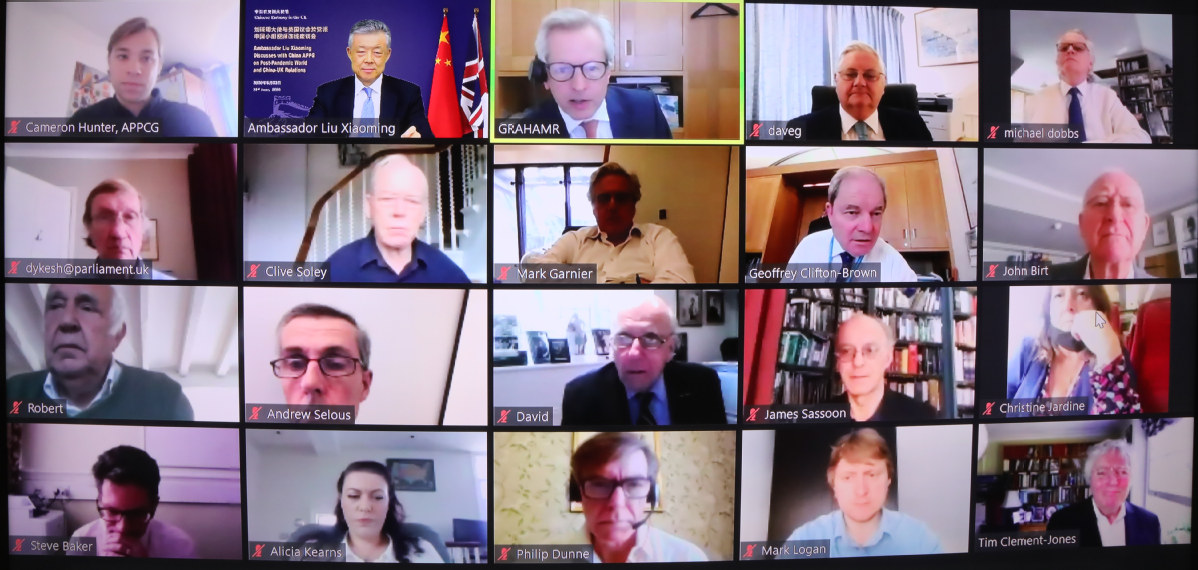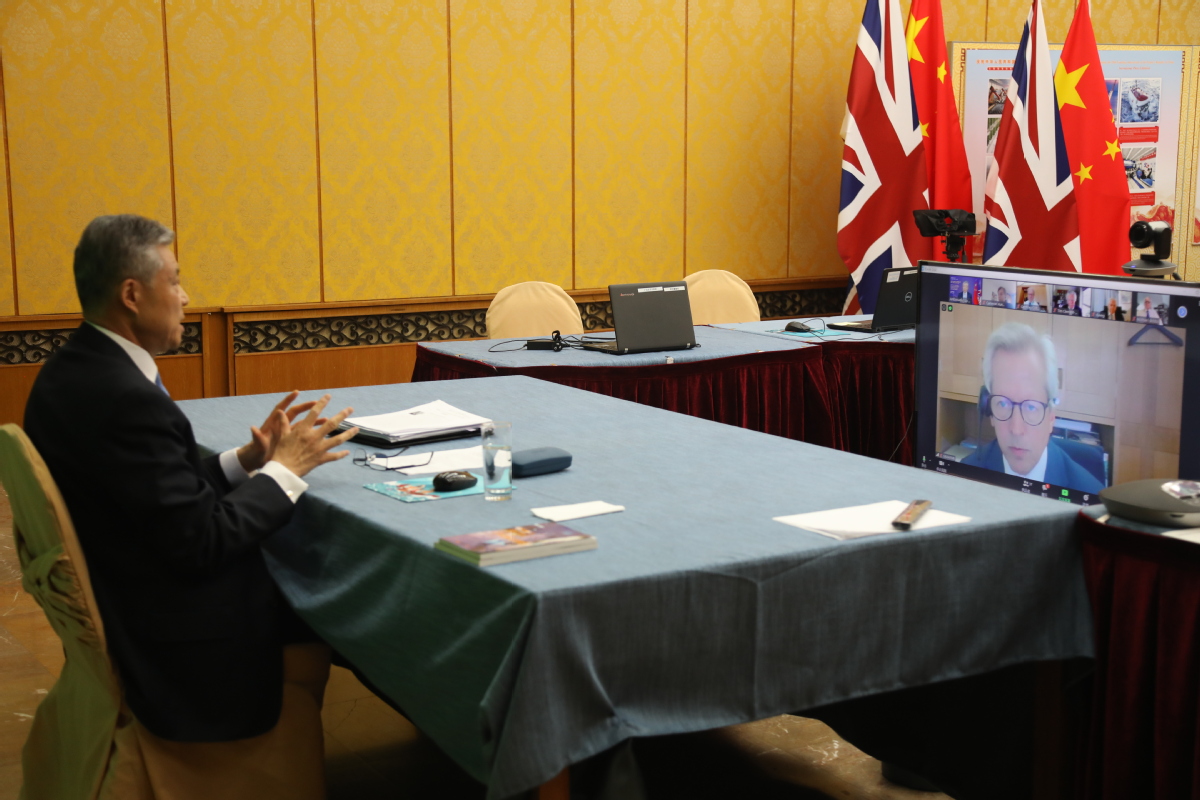Keynote Speech by H.E. Ambassador Liu Xiaoming at the APPCG Webinar: Stay Committed to Win-Win Cooperation


Now let me turn to the third part of my speech and explore whether and how we can achieve greater progress in China-UK relationship when we put the pandemic behind us.
I think the following three principles hold the key to the answer.
The first principle is equality and mutual respect.
Seventy years ago, the UK was the first major Western country to recognize New China. It is true we had differences throughout the past 70 years. But we have always found more common interests than differences. Our two countries are not driven apart by our differences. On the contrary, we have come closer because of common interests.
A look back at the history of China-UK relationship tells us that when we treated each other as equals, sought common ground despite differences and respected each other's core interests and major concerns, China-UK relationship would move forward in leaps and bounds. Otherwise, our relationship would suffer setbacks or even retrogression.
The most prominent challenge we face now is in relation to Hong Kong Special Administrative Region. Twenty-three years after the handover, some people in this country have yet to bid farewell to the colonial past. They keep making irresponsible remarks about Hong Kong and interfering in China's domestic affairs.
When China's top legislature, the National People's Congress (NPC), adopted the decision at this year's "Two Sessions" on national security legislation for Hong Kong SAR, and the draft law is placed under review by the NPC Standing Committee, some people once again made unwarranted and irresponsible remarks to demonize this legislative action. China strongly opposes this.
Why is the national security legislation for Hong Kong SAR necessary?
In the past 23 years since the handover, "One Country, Two Systems" has achieved tremendous success in Hong Kong SAR. However, this great city has been "defenseless" in terms of national security. This is caused by severe stigmatization and demonization of Article 23 of the Basic Law, which provides for the making of a national security law for the SAR. As a result, no such law has been enacted, making the SAR a risk and a loophole for national security.
In particular, since the turbulence over the proposed amendment bill in 2019, anti-China elements seeking to disrupt Hong Kong have clamoured for "Hong Kong independence" and "self determination". They have been engaged in separatist activities that threaten national unity and created terror in the city through violence, including beating, smashing, looting and arson.
These activities have gravely undermined the social stability, economic prosperity and public safety in Hong Kong. They have broken the bottom line of "One Country, Two Systems" and severely endangered China's national security. They have landed Hong Kong in the gravest situation since the handover.
As is in all countries, safeguarding national security is the primary responsibility of the Central Government and falls within the power of the Central Government.
Here in the UK, it is the Central Government and Parliament that are responsible for matters relating to national security in England, Scotland, Northern Ireland and Wales.
In China, it is the same. Therefore, it is within the power of the National People's Congress to plug the loophole that compromises national security in Hong Kong through legislation in accordance with the Constitution and the Basic Law. This is entirely reasonable and lawful. This is something that must be done.
This legislation targets only the few actions and activities that gravely jeopardize national security.
-It will not impact the high degree of autonomy in Hong Kong.
-It will not affect Hong Kong's independent judicial power, including the power of final adjudication.
-On the contrary, it will provide better safeguards for the lawful rights and freedom of the Hong Kong residents.
-It will ensure better protection of the legitimate rights and interests of foreign investors in the city.
-It will guarantee better rule of law and business environment in Hong Kong.
-And it will strengthen people's confidence in "One Country, Two Systems", and in Hong Kong's development in the future.
It has already won the support of the majority of the Hong Kong people. Some British businesses, including HSBC, Standard Chartered, Jardine Matheson and Swire Group have expressed their support. And many countries have also upheld justice and expressed their appreciation and support for this legislation.
Hong Kong is home to more than 300,000 British citizens and over 700 British firms. A prosperous and stable Hong Kong is in the interests of both China and the UK.
I believe that everyone who hopes to see long-term prosperity and stability in Hong Kong as well as steady and sustained development of "One Country, Two Systems" would understand the need for and support the national security legislation for the Hong Kong SAR.
It is my hope that MPs and Members of the Lords will be able to appreciate the big picture and major trend, and view this legislation from an objective, fair and reasonable perspective.
The second principle is to regard each other as opportunities and partners, rather than threats or rivals.
President Xi Jinping said, "History will demonstrate that the pursuit of the Chinese dream will bring to the world opportunities rather than threats, peace rather than turmoil, and progress rather than backwardness."
China is committed to peaceful development, pursues peaceful coexistence, mutually-beneficial cooperation and common development with all countries in the world, including the UK, and is ready to be a strategic partner of a "global Britain".
In recent days, there have been many discussions about Huawei and its presence in the UK. Some people urged the UK Government to change its decision on allowing Huawei in its 5G development and to impose restrictions on Chinese investment. This is a cause for concern in the Chinese business community in this country.
The question of Huawei is not simply about whether a private company from China is allowed to take part in the UK's 5G development. More importantly, it is about how the UK perceives China. Does it see China as a partner, a rival, or even a threat?
Huawei has been here for 19 years. It has worked for the economic and social progress locally and contributed to the development of the telecommunications sector of this country. It is a good example of win-win cooperation between China and the UK.
From 2012 to 2017, Huawei brought two billion pounds into Britain through investment and procurement, and created 26,000 jobs. In early 2018, Huawei pledged a further investment of three billion pounds in the UK over the next five years. As of today, over one billion pounds have been put in place.
Huawei is now working with NCSC (the National Cyber Security Centre of the UK) to improve the weak links in its products and technology, so as to do a better job in helping the UK realize its goal of full 5G coverage by the year 2025.
The decision on Huawei also matters to the UK's image in the world -- whether it remains a supporter of free trade and open cooperation, or not. This will have a very important bearing on the confidence of businesses from China and other countries in the UK.
It is my hope that the UK Government will, in light of the fundamental interests of the UK and the big picture of China-UK relationship, come to an independent judgment and decision, and continue to foster an open, fair, transparent and non-discriminatory environment here in this country for Chinese businesses, including Huawei.
The third principle is to manage differences through equal-footed dialogues rather than "megaphone diplomacy".
It is natural that China and the UK do not always see eye to eye. The key is to deal with the differences in a proper manner.
Take human rights for example. Some politicians have the inclination of politicizing human rights and applying "double standards".
But if they have no bias and take a look at what China has achieved in safeguarding human rights, they would recognize the rapid and tremendous progress. In the past 40 years since China started reform and opening up,
-China has grown to be the world's second largest economy.
-It has lifted 850 million people out of poverty and contributed over 70% of the world's total poverty reduction.
-Life expectancy for average Chinese is 77.3, approaching the level in developed countries.
China has the confidence and capability to overcome Covid-19 and other difficulties, and achieve its goal of eliminating absolute poverty and completing the building of a moderately prosperous society in all aspects this year.
Of course, no country is perfect. There is room for improvement on human rights in every country. There are always differences of views and sometimes even frictions, but the solution of differences can not be found in "megaphone diplomacy".
China stands ready to engage all the relevant parties in constructive dialogues in an open, candid, inclusive and cooperative attitude and on the basis of equality and mutual respect. However, we strongly oppose smears and accusations based on arrogance and bias.
China and the UK should make full use of existing channels, such as the China-UK Human Rights Dialogue, and engage in constructive discussions on issues of common concern.
My Lords and MPs,
Ladies and Gentlemen:
In the past 23 years since its establishment, APPCG has worked hard to promote dialogues and exchanges between the UK Parliament and China's NPC, and to enhance cooperation across the board. You have made significant contribution to better understanding and deeper trust between our two countries.
President Xi Jinping said,
In a closed room, you run into walls and can never get anywhere;
But if you open up, the road under your feet will become wider and wider.
It is my sincere hope that APPCG will continue to be a pioneer in enhancing understanding of China in the UK, a supporter for China-UK relations, a promoter of China-UK cooperation and a contributor to China-UK friendship.
I am confident that, with the concerted efforts of both sides, China and the UK will emerge from the pandemic with stronger relationship, broader cooperation and deeper friendship between our peoples.
Thank you!
Now I am ready to take your questions.
































